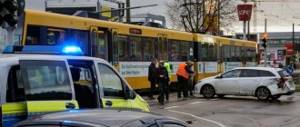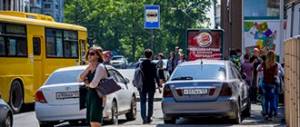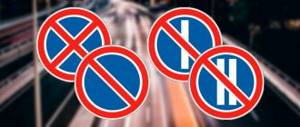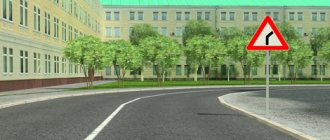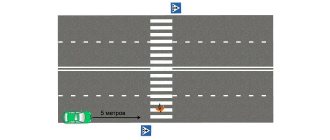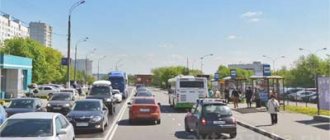How do you spell the word “stop”?
A large number of spelling rules of the Russian language are sometimes not enough to explain the spelling of some words. For this reason, the question of the spelling of a particular unit of speech makes a person of any generation think. The word “stop” comes across us in our daily lives more often than we ever thought. Let's figure out how to spell “installation” or “stopping”?
What does the traffic rules say?
Clause 12.4 of the traffic rules states that motorists are not allowed to stand at a parking lot/stop for public transport, as well as at a distance of less than 15 meters from this place, indicated by a road sign or markings. Clause 12.5 states that parking is prohibited in places where vehicles are not allowed to stop. According to the Code of Administrative Offenses, for parking or temporarily stopping the movement of a car in a place that is a bus stop, penalties are provided in the following amounts:
- Failure to comply with the rules of parking or stopping is a verbal warning or a fine of 500 rubles (the provisions of Article 12.19).
- The penalty for stopping near the point of disembarkation of people from public transport and pedestrian crossings (distance up to 5 meters) is 1000 rubles.
- Short or long-term parking at a bus stop, as well as on tram routes, is punishable by a fine of 1,500 rubles.
- If parking results in obstruction of other cars or public transport, the driver will be fined in the amount of 2,000 rubles.
- If the offense was committed in the capital or St. Petersburg, the fine will be 3,000 rubles (according to parts 3-4 of Article 12.19).
For this reason, it is not recommended to stop in a place that is intended for a bus, trolleybus or other public transport. It is worth noting that repeated violations may be punished more severely and the fine will be increased.
Which rule applies
In modern Russian there is no rule that could explain the spelling of this unit of speech. The accuracy of using such a noun in writing can only be confirmed by a spelling dictionary. And yet, etymology tells us that earlier in Russian speech there was such a concept as “stan”. This term denoted a place on a high road that was reserved specifically for passengers and vehicles. This lexeme included the prefix “o”, which over time grew into the root of the word, making it impossible to check the unstressed vowel. Ma figured out how to spell the word “stop.”
- the basis of the word is “stop”;
- root – “ stop”;
- suffix – “ k”;
- ending - “a”;
- the stress falls on the letter “-o” in the third syllable, there are 4 syllables in total (os-ta-no-vka).
Example sentences
- I got off the transport at a bus stop
on a country road, there was a post office, a small shop and a couple of benches near it. - We set off on a trip around the world on the ocean, making stops
off the coast of America, England, the Cape Verde Islands and Australia. - The long period of driving left my friend exhausted and we were forced to make a couple of stops
on the way to London.
Spelled incorrectly
It is considered incorrect to use a recitative in a letter with the letter “a” in the first syllable – “setting”.
- The bus moves along the route through nearby villages, making stops
in each village. - In our area, a new bus stop was built on the site of an old kiosk.
- We heard the smell of burning, and the driver decided to slow down, but the crash
turned out to be fatal, we saw a column of flame moving straight towards us. - Each train is equipped with a stop valve for forced emergency stops
in case of urgent need.
STOP
Ozhegov's explanatory dictionary. S.I. Ozhegov, N.Yu. Shvedova. 1949-1992.
See what “STOP” is in other dictionaries:
stop - Suspension, delay, slowdown, hitch, stagnation, calm, pause, respite, break, intermission, delay, delay, comma, period; congestion; halt, parking, day, overnight, stage, bivouac. Lull. Stagnation in trade.. Wed. . See... Dictionary of synonyms
STOP - STOP, stops, female. 1. Action under Ch. stop and stop. Train stop. Make two stops along the way. || Temporary break, termination. Unexpected work stoppage. 2. The place where the public stops for boarding... ... Ushakov’s Explanatory Dictionary
STOP - in the stomach. Kar. Indigestion. SRGK 4, 254. Technical stop. Jarg. tour. Visiting the toilet. Maksimov, 290 ... Large dictionary of Russian sayings
stop - STOP, hesitation, acceleration. hitch STOP/STOP, unwind. stutter/stammer, colloquial hesitate / hesitate, colloquial. stammer/stammer, colloquial cut short / cut short, colloquial, owl. choke, colloquial stumble / unravel stumble and... ... Dictionary-thesaurus of synonyms of Russian speech
Stop for - STOP, and, w. Ozhegov's explanatory dictionary. S.I. Ozhegov, N.Yu. Shvedova. 1949 1992 ... Ozhegov's Explanatory Dictionary
stop - a deliberate stop in the movement of a vehicle for up to 5 minutes, as well as for longer if this is necessary for boarding or disembarking passengers, or loading or unloading a vehicle (from traffic regulations). EdwART. Dictionary... ...Car Dictionary
stop - - [Ya.N.Luginsky, M.S.Fezi Zhilinskaya, Yu.S.Kabirov. English-Russian dictionary of electrical engineering and power engineering, Moscow, 1999] Topics of electrical engineering, basic concepts EN stopstandstillshutdown ... Technical Translator's Guide
STOP - cessation of movement, one of the arena exercises, with rom l. stands motionless and straight on all legs, calmly chewing iron. In this case, the L. must be stopped precisely as a precaution. program place... Handbook of horse breeding
Stop - Stop: Wiktionary has an article “stop” A public transport stop is specially designated ... Wikipedia
stop - noun, f., used. compare often Morphology: (no) what? stops, why? stop, (see) what? stop what? stop, what about? about stopping; pl. What? stops, (no) what? stops, why? stops, (see) what? stops, what? stops, about ... Dmitriev's Explanatory Dictionary
Source of the article: https://dic.academic.ru/dic.nsf/ogegova/142274
Stopping and parking at a bus stop (all on the shelves)
I get asked various questions regarding the fine for stopping at a bus stop, such as: is parking allowed before the bus stop sign or how long can you stand at the stop? Let's sort everything out piece by piece.
First, let's remember what stopping and parking are. Thus, according to the Russian Federation Traffic Regulations, “Stopping” is the deliberate cessation of the movement of a vehicle for a period of more than 5 minutes for reasons not related to the embarkation or disembarkation of passengers or the loading or unloading of a vehicle. “Stopping” is a deliberate cessation of the movement of a vehicle for up to 5 minutes, as well as for longer if this is necessary for boarding or disembarking passengers or loading or unloading the vehicle.
According to paragraph 12.4 of the traffic rules, stopping is prohibited closer than 15 meters from the stopping places for minibuses or parking for passenger taxis, indicated by marking 1.17, and in its absence - from the sign of the stopping place for minibuses or parking for passenger taxis (except for stops for boarding and disembarking passengers, if this does not interfere with the movement of route vehicles or vehicles used as passenger taxis).
Paragraph 12.5 of the traffic rules says that parking is prohibited in places where stopping is prohibited.
Part 3.1 of Article 12.19 of the Code of Administrative Offenses of the Russian Federation establishes that stopping or parking vehicles at stopping places for route vehicles, or closer than 15 meters from stopping places for route vehicles, with the exception of stopping for boarding or disembarking passengers, forced stops and cases, entails the imposition of an administrative a fine of one thousand rubles. For Moscow and St. Petersburg, the fine is 3,000 rubles.
In addition, stopping at a public transport stop requires the vehicle to be towed to an impound lot.
Parking up to the bus stop sign.
Parking a car before a bus stop sign or before a yellow marking is allowed if 15 meters are maintained, since the prohibition of stopping at a bus stop applies BEFORE and AFTER the sign.
How long can you stand at a bus stop?
Standing at a bus stop is prohibited, but you can stop for 5 minutes and only if passengers are disembarking or boarding and there is no interference with route vehicles.
Is it possible to cancel a fine for stopping at a traffic stop?
Yes, it is possible, but all cases are individual. For example, if you stopped and a traffic police crew immediately approached you, then the imposition of a fine is contestable, since it must be proven that you stood for more than 5 minutes. Reliable evidence from the traffic police is measuring the distance from your car to the sign, photographic recording or video recording.
But! It is worth knowing that the court can side with the inspector even without photos and videos, since Order of the Ministry of Internal Affairs No. 185 allows the employee to visually record the fact of the alleged offense and then the court has not established any reason not to trust the testimony.
After reading, I suggest you consolidate your knowledge by solving exam questions about stopping at a bus stop.
Stop or stop: which option is grammatically correct?
Grammar is important in both spoken and written words. When a person speaks and writes, he projects his level of intelligence and thoughtfulness. Demonstrates organization in one's own thoughts and intentions.
However, given how rapidly the digital world is changing the way we communicate, we may see grammar rules change more quickly. And sometimes not entirely correct. For example, on the Internet there are often two options - “stop” or “installation” - from different users. How to check the word in such a situation to be sure of literacy?
Origin of the word
In order to answer the question of which is correct - stop or astanovka, you need to understand the transformation of the word.
Since the time of Peter I, when no one asked themselves about the formation of the word in question, the word “station”, similar in meaning, appeared, derived from “stan” - the name of the tracts where people or mail were transported. Trains arrived at the station, foreign and domestic citizens set off on their journeys. The borrowing was taken from several languages at once - Polish, Ukrainian and Latin.
And if in the first two “station” had a similar decoding and spelling, then from Latin statiō meant “parking, stop”. This was the beginning of the noun.
All Ladas will remain cheap after the generation change, despite the appearance of expensive equipment
Lada
That is why, if a motorist is forced to make a stop or needs to wait for a passenger, then it is necessary to drive further from the bus stop in order to park his car not in the passenger drop-off and pick-up zone. However, despite such rules, many motorists neglect the established standards, which is why they receive appropriate punishment. In order not to encounter such a problem, motorists must have a clear idea of where they can stop their cars, and in which places this is prohibited. Author: Oleg Mokrov
Word designation
When using some words in speech, people quite often do not think about their meaning. And this is the main mistake! After all, it is knowledge that helps to form competent oral and written speech.
The word in question is mentioned in several meanings:
- Stop any movement while driving.
- Take a break after working for a long time without stopping.
- A designated place for public transport, fixed at the government level, where passengers board or disembark.
Thus, we can conclude that the noun indicates the cessation of a certain type of movement or action.
What is the penalty?
When the driver of a car parks or parks at a public transport stop, without the purpose of disembarking passengers from the passenger compartment, this becomes a reason for bringing charges against him under Article 12.19 of the Code of Administrative Offences. Part 3.1 establishes the rules for parking and stopping vehicles.
During such maneuvers in a zone of 15 meters from stopping areas for route transport without the purpose of boarding or disembarking people or the need to perform forced braking, a fine of 1000 rubles may be imposed.
What actions of the driver qualify as ignoring the parking and stopping rules indicated in the traffic rules:
- If the driver parked the car in a place where it creates problems for public transport when moving through this area, and he walked away, his car will be towed to the impound lot .
- If parking at a stop in violation of the rules took more than 5 minutes or is located in a zone of 15 meters from the sign, but does not interfere with the vehicle, the driver will be fined one thousand rubles (Article 12.19 of the Administrative Code). By standing at a bus or trolleybus stop and causing interference, a motorist risks earning a fine of 2,000 rubles.
- If the stop is made within a prohibited zone, then in federal cities they do not distinguish between whether the offender creates interference or not. Violating this rule in the capital or St. Petersburg, the driver receives a fine of 3,000 rubles .
Smart option
Which is correct: stopping or stopping? The word can be checked in a spelling dictionary - “Stop”.
Below are examples of the use of this word:
- Go to the bus stop to catch school.
- – Stop on Lenin Avenue, please! – the passenger shouted.
- The company's employees were overloaded with work, which meant they had to work nonstop all day.
Now that there is no doubt about the only correct spelling of the word "stop", you will not think about the incorrect spelling when you come across it somewhere on the Internet.
Write with confidence! Don't forget to mentally check. And over time, the word will stick in your head with just the correct spelling.
Source of the article: https://fb.ru/article/460118/ostanovka-ili-astanovka-kakoy-je-variant-grammaticheski-pravilnyiy
Let's sum it up
The driver may drop off his passengers at this location if it takes no more than 5 minutes and does not cause inconvenience to other road users.
The driver can also park at a stop if violations in the operation of vehicles are recorded. He must fix the problem as soon as possible or take serious measures, such as, for example, calling a tow truck, and not wait for the weather by the sea, hoping that the car will heal itself.
If a traffic police officer considers your actions to be a violation of traffic rules, a fine will be imposed, the amount of which varies from 1000 rubles, if no interference was created for others, and up to 2000 (3000 in Moscow and St. Petersburg) if there were difficulties in movement.
Therefore, you should not make stops unless absolutely necessary. It’s better to do this before or after 15 meters from the stop.
What is the correct way to pronounce Setup or Stop?
How to sleep properly? Head towards sunrise or towards sunset?
It depends on the layout of the bedroom. From the point of view of Feng Shui, the head of the bed should be facing a solid wall, so that while lying on the bed you can see the door and windows. It is not favorable to sleep with your head towards a window or door. If the bed is directly opposite the door, this is also not favorable.
When these conditions are met, you can check the direction according to the cardinal points. It is best to choose a favorable direction based on your date of birth and Min Gua according to the School of Eight Houses.
What is the correct spelling: suspend or unsuspend?
In the word “suspended” the prefix “at” is written. In this case, the choice of prefix is due to the fact that “suspend” is an incomplete action (it did not completely stop, but only suspended).
What is the difference between a participle and a gerund?
A gerund denotes an additional action or state and is associated with the main verb. A participle denotes a sign of an object or phenomenon.
What can cause confusion is that they are both formed from verbs, but they are easy to distinguish:
- The participle answers the question “which one?”
- gerunds - to the questions “what are you doing?” or “having done what?”
What are Trojan asteroids?
When any planet moves around the Sun, there are two regions along its orbit where the gravity of both bodies creates conditions for stable equilibrium. That is, if some incoming asteroid moves at a not too high relative speed and falls into one of these areas, then it will remain there for a long time, moving at approximately the same speed as the main planet. One of these points will be in front of the planet in its revolution around the Sun, and the other will be behind. It will look as if one group of asteroids is catching up with another. There was a similar plot in the Iliad, when the Greeks ran to their ships, and the Trojans caught up with them. For the first time, such asteroids were discovered near Jupiter; they were the first to be called “Greeks” and “Trojans”. Then, for brevity, they left one name “Trojan asteroids”
Source of the article: https://yandex.ru/q/question/home/kak_budet_pravilno_prioznesti_astanovka_5af50a73/
What fine is possible for parking at a bus stop?
But this is only provided that the driver’s actions did not create difficulties for the movement of passengers or public transport.
There is also a condition: if the transport stops for more than 5 minutes, then this is regarded as parking and a fine of 1000 rubles or 3000 in Moscow is imposed for this.
If such interference is created, then the fine increases:
4. Violation of the rules for stopping or parking vehicles on the roadway, resulting in the creation of obstacles to the movement of other vehicles, as well as stopping or parking a vehicle in a tunnel, except for the case provided for in part 6 of this article - (as amended by the Federal Law dated 04/21/2011 N 69-FZ) entails the imposition of an administrative fine in the amount of two thousand rubles (as amended by Federal Laws dated 06/22/2007 N 116-FZ, dated 04/21/2011 N 69-FZ).
But residents of two megacities were not lucky, since violation of part 3 or 4, committed in Moscow or St. Petersburg, entails a fine of 3,000 rubles.
Our experts have prepared for you a number of articles that describe various traffic violations and the traffic police fines imposed for them: for violating the “No Entry” road sign, for not wearing a seat belt and not turning on the low beams, for speeding and talking on the phone while driving, xenon headlights and tinting, for crossing double solid markings and running a red light at a railway crossing.
Is it possible to avoid punishment?
There is the concept of “involuntary stopping”, which implies circumstances as a result of which the car cannot continue moving. This may be due to:
- malfunction of the steering and brake systems;
- malfunction of optics (dimensions, headlights);
- malfunction of windshield wipers in bad weather conditions.
The driver cannot predict this, so such maneuvers are not considered illegal . On the contrary, these problems must be corrected immediately so that the operation of the car is safe.
STOP
Ushakov's Explanatory Dictionary. D.N. Ushakov. 1935-1940.
See what “STOP” is in other dictionaries:
stop - Suspension, delay, slowdown, hitch, stagnation, calm, pause, respite, break, intermission, delay, delay, comma, period; congestion; halt, parking, day, overnight, stage, bivouac. Lull. Stagnation in trade.. Wed. . See... Dictionary of synonyms
STOP - STOP, and, female. 1. see stop, sya. 2. Break (in speech, in actions). Talk non-stop. 3. Temporary parking along the way. Make a stop in the nearest city. 4. The place where city, scheduled passenger transport stops.… … Ozhegov’s Explanatory Dictionary
STOP - in the stomach. Kar. Indigestion. SRGK 4, 254. Technical stop. Jarg. tour. Visiting the toilet. Maksimov, 290 ... Large dictionary of Russian sayings
stop - STOP, hesitation, acceleration. hitch STOP/STOP, unwind. stutter/stammer, colloquial hesitate / hesitate, colloquial. stammer/stammer, colloquial cut short / cut short, colloquial, owl. choke, colloquial stumble / unravel stumble and... ... Dictionary-thesaurus of synonyms of Russian speech
Stop for - STOP, and, w. Ozhegov's explanatory dictionary. S.I. Ozhegov, N.Yu. Shvedova. 1949 1992 ... Ozhegov's Explanatory Dictionary
stop - a deliberate stop in the movement of a vehicle for up to 5 minutes, as well as for longer if this is necessary for boarding or disembarking passengers, or loading or unloading a vehicle (from traffic regulations). EdwART. Dictionary... ...Car Dictionary
stop - - [Ya.N.Luginsky, M.S.Fezi Zhilinskaya, Yu.S.Kabirov. English-Russian dictionary of electrical engineering and power engineering, Moscow, 1999] Topics of electrical engineering, basic concepts EN stopstandstillshutdown ... Technical Translator's Guide
STOP - cessation of movement, one of the arena exercises, with rom l. stands motionless and straight on all legs, calmly chewing iron. In this case, the L. must be stopped precisely as a precaution. program place... Handbook of horse breeding
Stop - Stop: Wiktionary has an article “stop” A public transport stop is specially designated ... Wikipedia
stop - noun, f., used. compare often Morphology: (no) what? stops, why? stop, (see) what? stop what? stop, what about? about stopping; pl. What? stops, (no) what? stops, why? stops, (see) what? stops, what? stops, about ... Dmitriev's Explanatory Dictionary
Source of the article: https://dic.academic.ru/dic.nsf/ushakov/906834
Wait
If a bus stops at a public transport stop marked with road sign 5.16, then it moves in accordance with the Road Traffic Rules (TRAF) and is not an obstacle to other vehicles. If overtaking is prohibited in this place, and the markings have one or two solid dividing lines, then, in accordance with traffic regulations, all cars must stop and wait until the bus leaves the public transport stop.
If one of the drivers starts an advance maneuver through a solid marking line, and even drives into the oncoming lane, then he will face serious punishment. In accordance with Part 4 of Article 12.15 of the Administrative Code, such a maneuver is regarded as overtaking in the wrong place and is punishable by a fine of 5,000 rubles or deprivation of rights for up to six months.
Therefore, to overtake, it is better to wait for sections of the road with intermittent markings.
How to spell correctly, stress on the word “next stop”
Associations to the phrase “next stop”
Synonyms for “next stop”
Sentences containing the phrase “next stop”
- Then the whistle blows - we jump into the train, and the train begins to move, but after traveling several tens of kilometers, it makes the next stop
.
Quotes from Russian classics with the phrase “next stop”
- We stopped in Serpukhov, quickly filled up with water, and flew again. Someone came to the door, pulled the handle and, having calmed down, “busy”, left. Then another stop, again they take water, again at the next stage they try to open the door... And here is Tula, we took water, we rush. Someone tries to twirl the handle again and leaves, cursing. A minute later I hear voices:
Verb Conjugation for "follow"
Conjugation of the word "next"
Associations to the word "stop"
Meaning of the word "follow"
FOLLOW, -blow, -blow; prib. present
next;
nesov.
1.
for someone or something.
Move (walk, drive, etc.) after, directly behind someone or something. (Small Academic Dictionary, MAS)
Meaning of the word "next"
NEXT, –aya, –ee. 1. Proverbs present from
follow. (Small Academic Dictionary, MAS)
The meaning of the word "stop"
STOP, -i, gen. pl.
–vok,
dat.
-vkam,
w.
1.
Action according to verb.
stop (in 1 digit)
and
stop (in 1 digit).
Stopping a train with a brake.
(Small Academic Dictionary, MAS)
Submit Comment
Additionally
Meaning of the word "follow"
FOLLOW, -blow, -blow; prib. present
next;
nesov.
1.
for someone or something.
Move (walk, drive, etc.) after, directly behind someone or something.
Meaning of the word "next"
The meaning of the word "stop"
STOP, -i, gen. pl.
–vok,
dat.
-vkam,
w.
1.
Action according to verb.
stop (in 1 digit)
and
stop (in 1 digit).
Stopping a train with a brake.
Sentences containing the phrase “next stop”
Then the whistle blows - we jump into the vehicles, and the train begins to move, but after traveling several tens of kilometers, it makes the next stop
.
- I didn’t lie! Before I could get out, I passed the school. But I wasn't late yet. At the next stop
jumped out and ran back, just wanted to cross the road...
- We're flying away! - one goblin shouted to the other. – You don’t know where the next stop is
?
Source of the article: https://kartaslov.ru/%D0%BA%D0%B0%D0%BA-%D0%BF%D1%80%D0%B0%D0%B2%D0%B8%D0%BB%D1 %8C%D0%BD%D0%BE-%D0%BF%D0%B8%D1%88%D0%B5%D1%82%D1%81%D1%8F-%D1%81%D0%BB%D0 %BE%D0%B2%D0%BE/%D1%81%D0%BB%D0%B5%D0%B4%D1%83%D1%8E%D1%89%D0%B0%D1%8F%20% D0%BE%D1%81%D1%82%D0%B0%D0%BD%D0%BE%D0%B2%D0%BA%D0%B0

